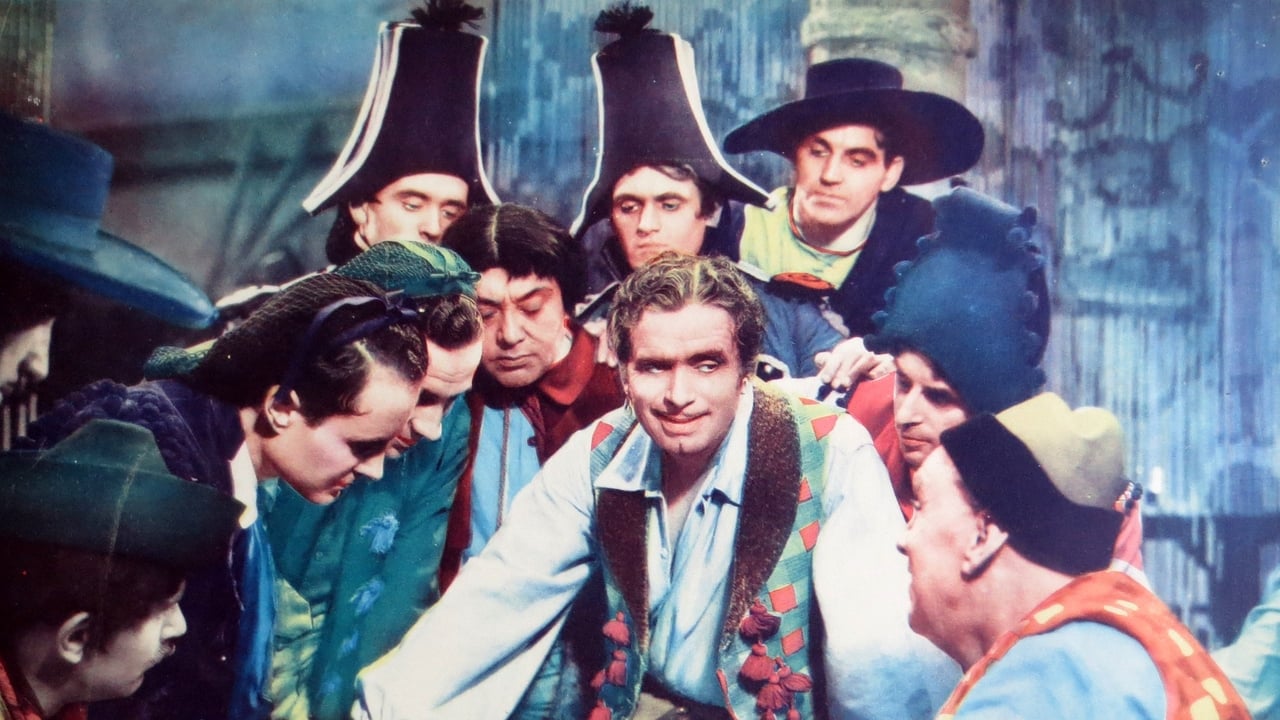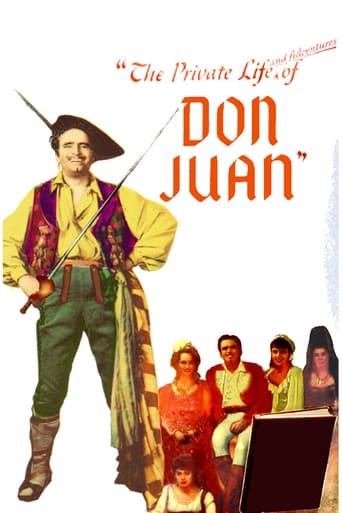



Instead, you get a movie that's enjoyable enough, but leaves you feeling like it could have been much, much more.
View MoreThis movie was so-so. It had it's moments, but wasn't the greatest.
View MoreI am only giving this movie a 1 for the great cast, though I can't imagine what any of them were thinking. This movie was horrible
View MoreGreat example of an old-fashioned, pure-at-heart escapist event movie that doesn't pretend to be anything that it's not and has boat loads of fun being its own ludicrous self.
View MoreFor once a Don Juan comedy and with a vengeance - it's a delightful entertainment all the way sugared and spiced with witty ironies galore, where the great Douglas Fairbanks takes the prize in a final victory over the legend of both himself and Don Juan by surviving both with even the crown of a happy ending. The film is studded with a generosity of festivity scenes, each one transcending the other, while the irony celebrates triumphs all the way, especially at Don Juan's own great funeral enjoyed by himself and the final great theatre scene, when he explains to the audience that he really is Don Juan with only roars of laughter for a response. This is magnificent entertainment of the 30s at its best, a feast for the eyes as well as for the intelligence, the script is a wonder of ingenious innovations, the dialogue outwits itself all the time sustaining the comedy vein at a high level with constantly new surprises, and the music isn't bad either. Don Juan is at last allowed to celebrate his ultimate victory!
View MoreIn 1934, at age 51, Douglas Fairbanks had already decided to end his magnificent and very prolific acting career. Not because he couldn't cope with sound (he had a very nice, strong voice), or with the kind of movies that were popular at the time - he'd originally started as a comedian before he went into the romantic swashbucklers that made him so hugely famous; and in the 30s, screwball comedies were at their height, so he could still have remained a top star for years if he'd wanted to.But he wanted to retire WHILE he was still on top - and while he could still perform some of those marvelous acrobatic tricks that he'd always employed in his swashbucklers as well as in his comedies and that he himself loved so much doing; and so, for his last role, he chose the one famous character that he hadn't impersonated yet among all the classic heroes of romantic fiction, and that suited him so very well: Don Juan - but an aging Don Juan. A Don Juan who had become tired of keeping in shape for balcony climbing and love-making to young ladies, something which required daily training and diet - a kind of self-confession that he conveyed through his role...So he shows us here for the last time a display of his famous sword fighting, balcony climbing, and of course romancing - but at the same time, he parodies not only the self-satisfied Don Juan with the myth that surrounds him, but also himself; he wasn't above that.He was in NO way obliged to admit to his doctor, who calls him "King of Hearts": - "Well, nowadays, when I sit down to a... quiet game with a lady, I'm - no longer sure of holding the card..." Neither to play that scene with the middle-aged innkeeper who has a go at him in a PRETTY unflattering way: "You've no money, no looks, not very much brain - and you're no chicken! You'd make a nice husband..." Neither to have all the young girls of Seville laugh at him when he, who was believed dead, finally steps in in the middle of a stage play about his own 'private life' and declares that HE is the real Don Juan...And yet he DID play all these scenes - because he wanted to. He wanted to say 'goodbye' to acting with a good dose of self-mockery; he was MAN enough not only to admit that time hadn't just passed him by, but to ridicule that fact in such an exaggerated way that again makes us say automatically: "But hey, you're just joking - you ARE the King of Hearts, and you always will be!" So, with this hilariously funny, bright, romantic costume piece full of action and laughter, Doug Fairbanks retired from the acting stage - not in a pathetic, dramatic way, but in a humorous, lovable one that's kept him in the hearts of his fans until this day. So that's the special meaning behind this very enjoyable period comedy-parody that certainly never gets dull or sentimental or boring for one single moment...
View MoreDouglas Fairbank Sr.'s swan song. He retired afterward and died five years later. Fairbanks was not very successful in the sound era, and this film was dismissed on its release, and flopped. It's actually pretty good, though. Fairbanks is a tad awkward, but it works in favor of the story. He plays an aging Don Juan. He is still a hit with the ladies, but he's annoyed that he has impersonators. After one of these impersonators is killed in action, Don Juan takes the opportunity to retire from the business, faking his own death. At first he enjoys his life as a regular man, but when he discovers that romance is much more difficult without his reputation preceding him, he decides to re-enter the identity of Don Juan. Problem is, no one believes him. It's a clever and very funny movie, beautifully shot and well acted. Merle Oberon is especially entertaining as a dancer.
View MoreAfter making four relatively minor films as sound movies, Douglas Fairbanks Sr. concluded his career with a good film. No ROBIN HOOD or THE BLACK PIRATE perhaps, but THE PRIVATE LIFE OF DON JUAN managed to give a coda to his career as screen presence, by giving him the role of a legendary lover who discovers that age catches up with legends.Made in England by Alexander Korda, THE PRIVATE LIFE OF DON JUAN was one of a series of "historical" dramas and biographies (here a pseudo-biography) by Korda that would include Henry VIII, Rembrandt, and Catherine the Great as subjects. As a result, the cast includes such Korda familiar faces as his wife Merle Oberon and Binnie Barnes.Fairbanks' Don Juan is over fifty, but still exuberant, and still a master of seduction. However his wise valet Leporello (Melville Cooper in a nicely phrased performance) is getting tired (after decades of such work) of helping extricate his master from various sexual escapades. Perhaps they were more tolerable when Juan was twenty or thirty, or even forty, but a middle-aged man of fifty should settle down.Years earlier Juan had married (legally) Dona Dolores (Benita Hume - later, in real life, Mrs. Ronald Colman). Hume wants him to come to his senses and return to her - she's aware he is not the romantic hero of the age anymore. Cooper is aware of this and soon is working with Hume to manipulate Fairbanks into growing up.A chance helps them. A young fool is going around Seville pretending to be Juan, and steals into the house of Juan to learn the master's secrets. He also steals some personal items of Juan, and soon afterward is caught in the house of a young married woman by her husband (Gibson Gowland - "McTeague" in Von Stroheim's GREED), who reluctantly challenges him to a duel. Gowland is reluctant because Don Juan's reputation is a class A fencer. However the impostor is not as good, and is run through. News spreads that the great lover has been finally killed by a cuckolded husband. Gowland's popularity shoots up, and the women in Seville go into morning.Fairbanks is initially going to straighten out the issue, but is "convinced" by Cooper to take advantage of it to get away and have a vacation. He decides to do that, pretending he is a retired sea captain and going to a sea port. Here he soon is pursuing his old interests, but he finds that the young woman he "attracted" wants him to assist her in contacting her real boyfriend (she thinks Fairbanks is a wise old man who can help her). Similarly, when he approaches Binnie Barnes, the maid in the inn, she's willing - if he buys her really nice presents of jewelry (he gives her some in disgust!). The inn-keeper (about five or six years older than Fairbanks) offers him a chance for marriage. He is now thoroughly tired of the vacation, and returns home.But everyone thinks he is dead - he can't convince anyone he is not dead. He sees a play about his life in a theater and interrupts (a situation like that of Baron Von Munchausen in the 1989 movie). But everyone there, including Gowland and Oberon - a former lover - refuse to acknowledge this old man as the great dead man. He is laughed off the stage. But Cooper is there to guide him to Hume, and the film ends with Fairbanks realizing that Hume expects him to be as passionate and expert as a lover - and will never laugh at him like the others. Fairbanks happily accepts the final situation with relief.It was a marvelous performance, showing Douglas Fairbanks at his best, in all but youthful vigor. It gave him a final film of stature to end with. Maybe he could have continued into good character roles, but as he to end somewhere, this film was a good place to end.
View More